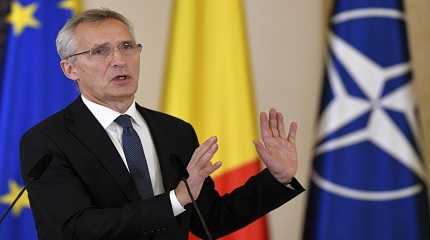
BRUSSELS, July 4 (Reuters) - NATO decided on Tuesday to extend Secretary General Jens Stoltenberg’s contract by a further year, opting to stick with an experienced leader as war rages on the alliance’s doorstep rather than try to agree on a successor.
Stoltenberg, a former prime minister of Norway, has been the transatlantic security alliance’s leader since 2014 and his tenure had already been extended three previous times.
The decision means continuity at the top of NATO as its 31 members grapple with the challenge of supporting Ukraine in repelling Moscow’s invasion while avoiding a direct conflict between NATO and Russian forces.
Stoltenberg, 64, is widely seen across the alliance as a steady leader and patient consensus-builder.
In a tweet, Stoltenberg said he was honoured by the decision to extend his term to October 1, 2024.
"The transatlantic bond between Europe and North America has ensured our freedom and security for nearly 75 years, and in a more dangerous world, our Alliance is more important than ever," he said.
Diplomats and analysts give Stoltenberg high marks for keeping NATO together over Ukraine, striking a balance between those demanding maximum support for Kyiv and others urging more caution out of fear of sparking a global conflict.
"NATO member states have decided logically enough that the best secretary general currently on the market place is the one they already have. Experience matters especially at one of the most testing times in NATO’s history," said Jamie Shea, a former senior NATO official now with the Chatham House think tank.
His next tasks include overseeing a transformation of NATO forces to refocus on defending against any Russian attack, after decades in which the alliance concentrated on missions beyond its borders, such as in Afghanistan and the Balkans.
He will also have to manage differences over how involved NATO should become in Asia, with the United States pushing for a greater role in countering China, while others such as France insist NATO must maintain focus on the North Atlantic area.
Stoltenberg also won widespread praise for guiding the alliance through severe transatlantic turbulence during the U.S. presidency of Donald Trump, who openly speculated about taking the United States out of NATO.
However, some NATO officials felt this year would be the right time to bring in fresh leadership, and Stoltenberg had said in February he was not seeking a further extension.
Diplomats and politicians held discussions about a potential successor. Some argued it was high time the alliance had its first female boss. Others pressed the case for a first secretary general from eastern Europe.
British Defence Secretary Ben Wallace declared he would like the job. Danish Prime Minister Mette Frederiksen was seen as a serious contender by diplomats, even though she insisted publicly she was not a candidate.
But as the clock ticked down to a NATO summit in Vilnius, Lithuania, on July 11 and 12, diplomats said no consensus on a successor was emerging. So NATO - and above all its predominant power, the United States - turned back to Stoltenberg.
Shea said NATO now needs to consider succession planning and identify someone who will reflect its future image and direction, and builds on partnerships with other organisations such as the European Union.




